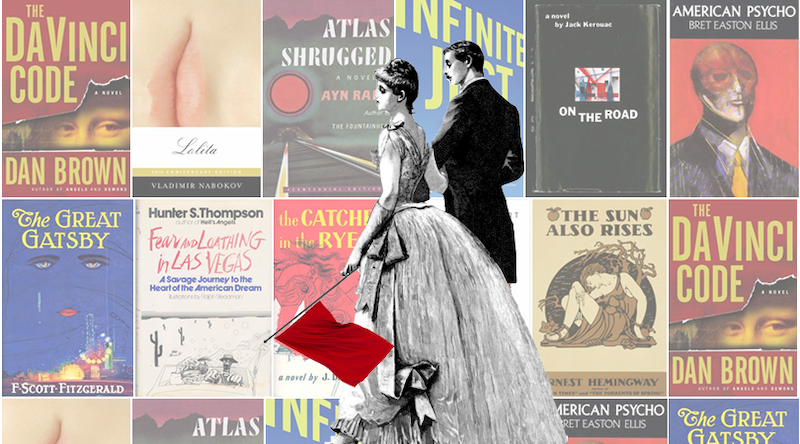
Literary twitter was abuzz yesterday thanks to a tweet from writer and editor Laura Relyea which posed the devilish question “What books are automatic red flags for you with people?” Essentially, Relyea wanted to know what books, if stan‘ed for by a potential romantic partner, would turn you off said potential romantic partner, giving the example of once calling off a date with a guy because his favorite book was Lolita.
Unsurprisingly, people had opinions. Hoo boy did they have opinions. All the old familiar faces were present and correct in the replies: Ayn Rand and her libertarian bible, J. D. Salinger and his tale of adolescent angst, Jack Kerouac and his rambling road trip, and many, many more totemic American novels.
Now, we’re not here to tell you which books you should or should not read in the privacy of your own bedroom, but based on recent polling, if you’re hoping to share that bedroom with someone, you might not want to mention your obsession with any of the following problematic faves during your next tinder date.
*
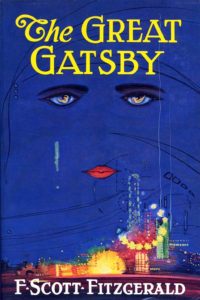
The Great Gatsby by F. Scott Fitzgerald (1925)
So we beat on, boats against the current, borne back ceaselessly into the past.
“Scott Fitzgerald’s new novel, The Great Gatsby is in form no more than a glorified anecdote, and not too probable at that … This story is obviously unimportant and, though, as I shall show, it has its place in the Fitzgerald canon, it is certainly not to be put on the same shelf with, say, This Side of Paradise. What ails it, fundamentally, is the plain fact that it is simply a story—that Fitzgerald seems to be far more interested in maintaining its suspense than in getting under the skins of its people. It is not that they are false: it is that they are taken too much for granted. Only Gatsby himself genuinely lives and breathes. The rest are mere marionettes—often astonishingly lifelike, but nevertheless not quite alive.”
–H.L. Mencken, The Chicago Tribune, 1925
*
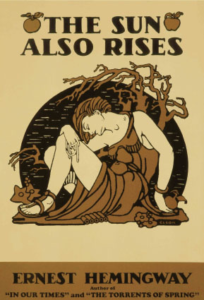
The Sun Also Rises by Ernest Hemingway (1926)
Everyone behaves badly—given the chance.
“The critics seem to be full of praise for your style and ability to draw word pictures but the decent ones always regret that you should use such great gifts in perpetuating the lives and habits of so degraded a strata of humanity … It is a doubtful honor to produce one of the filthiest books of the year … What is the matter? Have you ceased to be interested in nobility, honor and fineness in life? … Surely you have other words in your vocabulary than ‘damn’ and ‘bitch’—Every page fills me with a sick loathing.”
–Grace Hemingway (in a 1926 letter to her son)
*
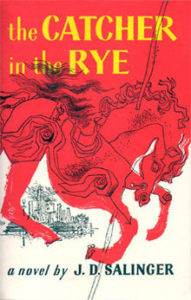
The Catcher in the Rye by J.D. Salinger (1951)
I was surrounded by phonies…They were coming in the goddam window.
“In the course of 277 pages, the reader wearies of [his] explicitness, repetition and adolesence, exactly as one would weary of Holden himself. And this reader at least suffered from an irritated feeling that Holden was not quite so sensitive and perceptive as he, and his creator, thought he was. In any case he is so completely self-centered that the other characters who wander through the book—with the notable exception of his sister Phoebe—have nothing like his authenticity … In a writer of Salinger’s undeniable talent, one expects something more.”
–Anne L. Goodman, The New Republic, 1951
*
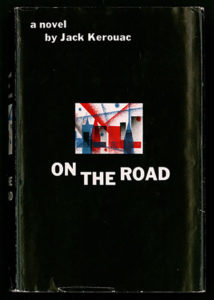
On the Road by Jack Kerouac (1957)
…the only people for me are the mad ones, the ones who are mad to live, mad to talk, mad to be saved
“Kerouac is supposed to be the spokesman of the ‘beat’ generation. Who beat them and why is not clear. Nothing is clear except an irresistible urge to live up and keep moving. His immersion in the sensations of the moment might be described as a homespun, American-type existentialism. His writing, like the behavior of his characters, is full of a provocative sound and fury but with about as much philosophical meaning as a Sears-Roebuck catalogue.”
–Thomas B. Sherman, The St. Louis Post-Dispatch, October 6, 1957
*
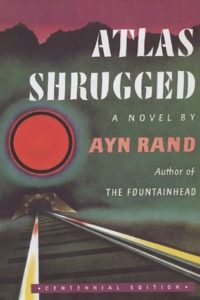
Atlas Shrugged by Ayn Rand (1957)
Run for your life from any man who tells you that money is evil.
That sentence is the leper’s bell of an approaching looter.
““The news about this book seems to me to be that any ordinarily sensible head could not possibly take it seriously, and that, apparently, a good many do. Somebody has called it: ‘Excruciatingly awful.’ I find it a remarkably silly book. It is certainly a bumptious one. Its story is preposterous … Atlas Shrugged can be called a novel only by devaluing the term. It is a massive tract for the times. Its story merely serves Miss Rand to get the customers inside the tent, and as a soapbox for delivering her Message. The Message is the thing. It is, in sum, a forthright philosophic materialism … Out of a lifetime of reading, I can recall no other book in which a tone of overriding arrogance was so implacably sustained. Its shrillness is without reprieve. Its dogmatism is without appeal.”
–Whittaker Chambers, The National Review, December 28, 1957
*

Lolita by Vladimir Nabokov (1958)
Lolita, light of my life, fire of my loins. My sin, my soul. Lo-lee-ta…
“There are two equally serious reasons why it isn’t worth any adult reader’s attention. The first is that it is dull, dull, dull in a pretentious, florid and archly fatuous fashion. The second is that it is repulsive. Lolita is not crudely crammed with Anglo-Saxon nouns and verbs and explicitly described scenes of sexual violence. Its depravity is more refined. Mr. Nabokov, whose English vocabulary would astound the editors of the Oxford Dictionary, does not write cheap pornography. He writes highbrow pornography. Perhaps that is not his intention. Perhaps he thinks of his book as a satirical comedy and as an exploration of abnormal psychology. Nevertheless, Lolita is disgusting.”
–Orville Prescott, The New York Times, August 18, 1958
*
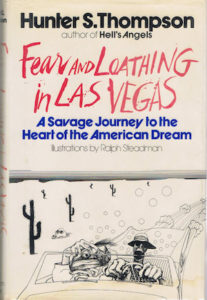
Fear and Loathing in Las Vegas by Hunter S. Thompson (1971)
Too weird to live, too rare to die!
“This is more hype than book. It needs some humanity and a better understanding of what time it is. The book is in the zonked, road-writing tradition of Jack Kerouac, but it lacks Kerouac’s bleeding feelings. Despite some hip ironies and several funny episodes, Thompson’s world is loveless. People never become more than the one-faced drawings by Ralph Steadman which animate the book. Failing or unable to get beneath what he sees, Thompson is yet another carrier of journalism’s current typhus: he transmits surface description as analysis. When you can’t perceive, describe”
–The New Republic, October 14, 1972
*
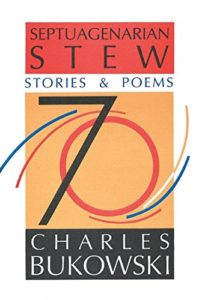
Septuagenarian Stew by Charles Bukowski (1990)
People were caught in traps. People were defensive and frantic.
They felt as if their lives were being wasted. And they were right.
“Charles Bukowski loves to present himself as a crusty arrogant old man, proud of his years spent as a heavy-drinking bum, living the low life and thumbing his nose at the literary world and bourgeois society in general. In this regard, he shares company with William Burroughs, but while Mr. Burroughs specializes in weirdly vivid imagery and nearly hysterical satire, Mr. Bukowski’s prose reflects bemused wonder at life’s ongoing and all too familiar atrocities. In Septuagenarian Stew, his subjects are nearly always the same: drinking and womanizing; hanging out in bars, at the racetrack, in low-rent neighborhoods and low-down apartments; once in a while being recognized as the great writer fallen on hard times. Elsewhere, however, Mr. Bukowski’s authorial persona, having come into some money from an indulgent publisher, rather relishes the good life he has so long eschewed. Aside from the rather harrowing story ‘Son of Satan,’ in which a group of young toughs nearly succeeds in murdering a friend, most of the stories in this collection never get off the ground. Mr. Bukowski doesn’t empathize with others—especially not with women—and the further characters stray from his own likeness, the flatter they become. His loosely constructed poems range from narratives forced into staggered lines to spare meditations leavened by a knowing wit. At best Mr. Bukowski comes across as a benign, somewhat bewildered spirit capable of surprising insights, at worst as a lazy writer unwilling to push his language to produce something extraordinary.”
–Lois E. Nesbitt, The New York Times, November 25, 1990
*

American Psycho by Bret Easton Ellis (1991)
…there is an idea of a Patrick Bateman, some kind of abstraction, but there is no real me, only an entity, something illusory, and though I can hide my cold gaze and you can shake my hand and feel flesh gripping yours and maybe you can even sense our lifestyles are probably comparable: I simply am not there.
“…a contemptible piece of pornography, the literary equivalent of a snuff flick. Its concluding 150 pages can only be described as repulsive, a bloodbath serving no purpose save that of morbidity, titillation and sensation; American Psycho is a loathsome book … Beneath its very thin veneer of thematic posturing American Psycho is pure trash, as scummy and mean as anything it depicts: a dirty book by a dirty writer. Of course Ellis has every right to write it, and Vintage every right to publish it. But the rest of us have every right not to read it; as one who did so out of duty, and who feels thoroughly soiled by the experience, I can only urge—no, pray—that everyone else refuse to do so by choice.”
–Jonathan Yardley, The Washington Post, February 27, 1991
*

Infinite Jest by David Foster Wallace (1996)
Everybody is identical in their secret unspoken belief that way deep down they are different from everyone else.
“If nothing else, the success of Infinite Jest is proof that the Great American Hype Machine can still work wonders, in terms of sales … What makes the book’s success even more noteworthy is that it is, in a word, terrible. Other words I might use include bloated, boring, gratuitous, and—perhaps especially—uncontrolled. I would, in fact, go so far as to say that Infinite Jest is one of the very few novels for which the phrase ‘not worth the paper it’s written on’ has real meaning in at least an ecological sense; but to resort to such hyperbole would be to fall into the rut that characterizes many reviews of this novel … I found Infinite Jest immensely unsatisfactory. I resent the five weeks of my life I gave over to it; I resent every endlessly over-elaborated gag in the book, like the ten-page riff on why video telephones are unviable, or the dozen pages on the teenager who won all his tennis games by playing with a pistol held to his head, or the thousands and thousands and thousands of words devoted to pharmaceutical trivia on all sorts of mind-altering drugs; and I resent especially the 96 pages of tinily typed and deliberately pointless endnotes and ‘errata,’ 388 in total, which make the novel a two-bookmark experience.”
–Dale Peck, The London Review of Books, July 18, 1996
*

Fight Club by Chuck Palahniuk (1996)
“Let me be blunt: I don’t find this kind of story titillating—although I’m sure many of Palahniuk’s fans are entranced by it. But I do recognize that, behind the exaggerations of fiction, resides a certain true-to-life quality in the personalities depicted here. A real sub-culture exists that matches, to some degree, the rule-breaking ethos depicted in Fight Club. I’m not surprised that, in the years following the publication of this novel, the author was frequently approached by fans who either (1) believed that many elements in it were based on actual events, or (2) were determined to turn them into actual events. From this perspective, Palahniuk has at least surpassed Bret Easton Ellis, whose Harvard-MBA-turned-serial-killer is pure hokum aimed to gain notoriety through sheer shock value … Is that a sufficiently redeeming quality for this nasty book? Well, if you seek redemption on any level, from the spiritual to the metaphorical, this book is thin gruel indeed. But you may walk away from it better informed, especially when your kids come home with bits of metal embedded in various soft tissues, or your coworker shows up at his desk with a black eye and a hole in his cheek. If you’ve read Palahniuk, you won’t need to ask. Even more to the point, you won’t want to.”
*
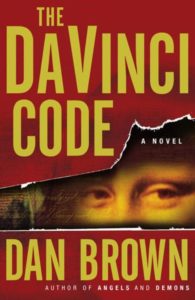
The Da Vinci Code by Dan Brown (2003)
Life is filled with secrets. You can’t learn them all at once.
“There has been much debate over Dan Brown’s novel ever since it was published, in 2003, but no question has been more contentious than this: if a person of sound mind begins reading the book at ten o’clock in the morning, at what time will he or she come to the realization that it is unmitigated junk? The answer, in my case, was 10:00.03, shortly after I read the opening sentence ‘Renowned curator Jacques Saunière staggered through the vaulted archway of the museum’s Grand Gallery.’ With that one word, ‘renowned,’ Brown proves that he hails from the school of elbow-joggers—nervy, worrisome authors who can’t stop shoving us along with jabs of information and opinion that we don’t yet require. (Buried far below this tic is an author’s fear that his command of basic, unadorned English will not do the job; in the case of Brown, he’s right) … Even as you clear away the rubble of the prose, what shows through is the folly of the central conceit, and, worse still, the pride that the author seems to take in his theological presumption. How timid—how undefended in their powers of reason—must people be in order to yield to such preening? Are they reading The Da Vinci Code because everybody on the subway is doing the same, and, if so, why, when they reach their stop, do they not realize their mistake and leave it on the seat, to be gathered up by the next sucker?
–Anthony Lane, The New Yorker, May 29, 2006
*

Eat Pray Love by Elizabeth Gilbert (2006)
This is a good sign, having a broken heart. It means we have tried for something.
“Gilbert’s writing propounds a comic cult of female personality, a kind of literary incarnation of the ‘best friend.’ From the mouth of this witty warrior-woman the female reader is prepared to hear nearly anything, to have her gender secrets, her most private embarrassments, her deepest dissatisfactions disclosed. In ‘best friend’ language, humor is a culturally approved manifestation of ambivalence, in which the love of life asserts itself over the admission of destructive desires … Eat, Pray, Love can be placed unequivocally in this tradition. Women like this literature because it alleviates feelings of pressure without the attendant risks of rebellion or change. Nothing is lost or destroyed or interrogated by comedy, or at least not literally. Yet a book is a placement of internal material in public space. The more representative it is of what people personally feel, the more satisfying and necessary its publication … The problem lies in the egotism of these female goddesses and gurus, who require their (female) audience to stand still while they twirl about, who require us to watch and listen, to laugh at their jokes, to admire their beauty and their reality and their freedom, to witness their successes. Elizabeth Gilbert is a relentless cataloguer of such successes, social, gastronomic, spiritual and sexual: the pizza she eats in Naples, the lover she takes in Bali, the friends she makes, even the quality of her transcendence at the ashram, all are perfect, the very best. This voyage of self-discovery, it turns out, was a competition, at whose heart is a need to win
–Rachel Cusk, The Guardian, September 24, 2010
*
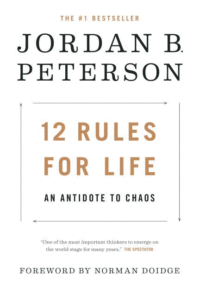
12 Rules for Life by Jordan Peterson (2018)
To stand up straight with your shoulders back is to accept the terrible responsibility of life, with eyes wide open
“Once the cloud of testosterone has cleared, the reader discovers that each of Peterson’s 12 rules is explained in an essay delivered in a baroque style that combines pull-your-socks-up scolding with footnoted references to academic papers and Blavatskyesque metaphysical flights…The effect is bizarre, like being shouted at by a rugby coach in a sarong … Unfortunately, he is not a man who will be content with a heuristic when he thinks there’s a fundamental truth to be had. As a good student of Jung, he likes an archetype, ideally one he can ground in biology … What makes this book so irritating is Peterson’s failure to follow many of the rules he sets out with such sententiousness…He is happy to dish out a stern injunction against straw-manning, but his ‘Postmodernists’ and Marxists are the flimsiest of scarecrows, so his chest-thumping intellectual victories seem hollow. He appears sincere, and in some ways admirable in his fierce desire for truth, but he is much less far along his journey than he thinks, and one ends his oppressive, hectoring book relieved to be free of him.”
–Hari Kunzru, The Guardian, January 18, 2018

